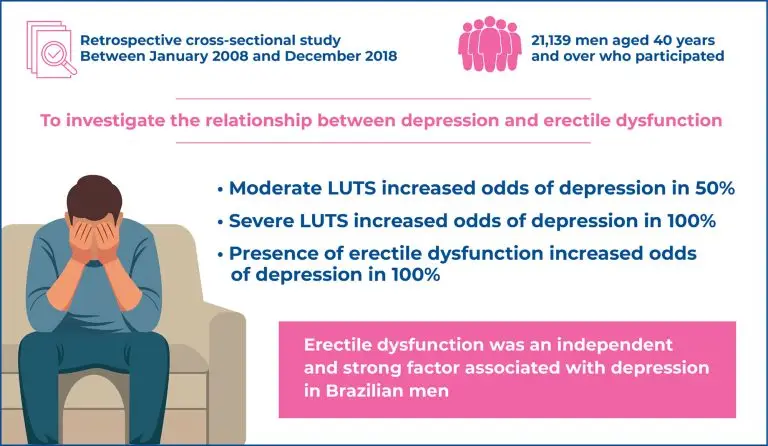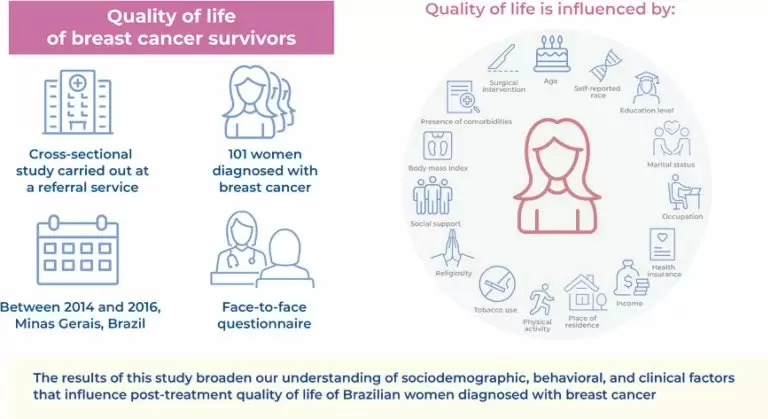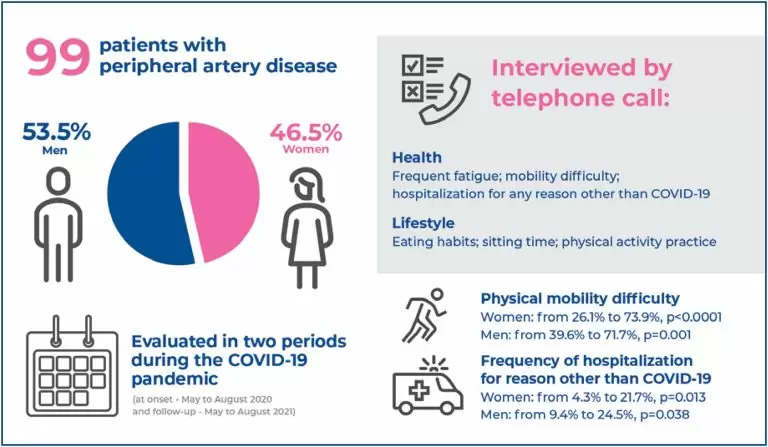25/Nov/2024
The association between erectile dysfunction and depression: a cross-sectional study of 21,139 Brazilian men
DOI: 10.31744/einstein_journal/2024AO1063
Highlights Levels of lower urinary tract symptoms increased the risk of depression. Erectile dysfunction, alcohol consumption, and body mass index were associated with an increased likelihood of depression. ABSTRACT Objective: This study aimed to investigate the relationship between depression and erectile dysfunction while controlling for sociodemographic, physical health, psychological, and lifestyle factors. Additionally, it aimed to compare erectile dysfunction with other clinical, laboratory, and behavioral variables among individuals with depression in the same population. Methods: We included 21,139 men (≥40 […]
Keywords: Depression; Erectile dysfunction; Exercise; Life style; Obesity
14/Mar/2024
Quality of life of women who underwent breast cancer treatment relative to sociodemographic, behavioral, and clinical factors
einstein (São Paulo). 14/Mar/2024;22:eAO0585.
View Article14/Mar/2024
Quality of life of women who underwent breast cancer treatment relative to sociodemographic, behavioral, and clinical factors
DOI: 10.31744/einstein_journal/2024AO0585
Highlights Sociodemographic, clinical, and lifestyle factors impact the quality of life of breast cancer survivors. Breast cancer therapy may affect future perspectives and emotional, cognitive, and sexual function. Some aspects of quality of life still require attention from health professionals. ABSTRACT Objective: Patients with cancer often undergo multiple extended treatments that decrease their quality of life. However, the quality of life of women with breast cancer after they undergo treatment remains underexplored in Brazil. Therefore, this study determined sociodemographic, behavioral, […]
Keywords: Activities of Daily Living; Breast neoplasms; Life style; Quality of life; Sociodemographic factors; Surveys and questionnaires
22/Feb/2024
Health and lifestyle parameters in peripheral artery disease at two periods of the COVID-19 pandemic: comparison between men and women
einstein (São Paulo). 22/Feb/2024;22:eAO0345.
View Article22/Feb/2024
Health and lifestyle parameters in peripheral artery disease at two periods of the COVID-19 pandemic: comparison between men and women
DOI: 10.31744/einstein_journal/2024AO0345
Highlights Sitting time increased in 73.9% of women and 84.9% of men at the onset of the pandemic. Physical activity was practiced by 23.9% of women and 39.6% of men at the onset of the pandemic. The prevalence of both women and men reporting physical mobility difficulties increased at follow-up. Hospitalization rates for reasons unrelated to COVID-19 have increased in both women and men. ABSTRACT Objective: This study analyzed the impact of sex on self-reported health and lifestyle parameters in […]
Keywords: Coronavirus infections; COVID-19; Exercise; Intermittent claudication; Life style; Mental Health; Pandemics; Peripheral arterial disease; Sex characteristics; Social isolation
17/Jun/2019
Physical activity level and lifestyle perception in prebariatric surgery patients
DOI: 10.31744/einstein_journal/2019AO4619
Abstract Objective To determine sociodemographic characteristics, lifestyle perception and physical activity levels in obese prebariatric surgery patients. Methods A quantitative, cross-sectional study. The sample comprised 96 male and female morbidly obese prebariatric surgery patients. Questionnaires addressing sociodemographic profile, lifestyle perception and physical activity levels were applied. Results Patients were aged 40.3±11.45 years. Inadequate levels of physical activity were reported by 47.8% of patients; most respondents (79.2%) attributed scores defined as inadequate to the physical activity domain of the lifestyle questionnaire. […]
Keywords: Bariatric surgery; Health Promotion; Life style; Motor activity; Obesity
01/Jul/2011
Depressive symptoms in patients with acute coronary syndrome
DOI: 10.1590/S1679-45082011AO1721
ABSTRACT Objective: To trace an epidemiological profile, to verify presence of depressive symptoms in patients with previous diagnosis of acute coronary syndrome and to identify factors that contribute to maintenance of depressive symptoms in the sample. Methods:A cross-section study carried out at the Cardiology Outpatients Clinics of Universidade Federal de São Paulo. An instrument prepared by the authors was used, which was based on similar studies with patient identification data, questions related to the psychological follow-up, relationship with family members […]
Keywords: Acute coronary syndrome; Depression; Life style; Myocardial infarction




